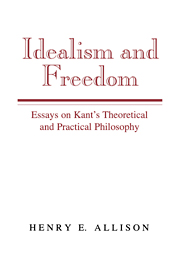Book contents
- Frontmatter
- Contents
- Acknowledgments
- Note on sources and key to abbreviations and translations
- Introduction
- Part I Kant's theoretical philosophy
- 1 Transcendental idealism: A Retrospective
- 2 Reflections on the B-Deduction
- 3 Apperception and analyticity in the B-Deduction
- 4 On naturalizing Kant's transcendental psychology
- 5 Gurwitsch's interpretation of Kant: Reflections of a former student
- 6 Causality and causal law in Kant: A critique of Michael Friedman
- 7 Kant's refutation of materialism
- Part II Kant's practical philosophy
- Notes
- Index
4 - On naturalizing Kant's transcendental psychology
Published online by Cambridge University Press: 05 June 2012
- Frontmatter
- Contents
- Acknowledgments
- Note on sources and key to abbreviations and translations
- Introduction
- Part I Kant's theoretical philosophy
- 1 Transcendental idealism: A Retrospective
- 2 Reflections on the B-Deduction
- 3 Apperception and analyticity in the B-Deduction
- 4 On naturalizing Kant's transcendental psychology
- 5 Gurwitsch's interpretation of Kant: Reflections of a former student
- 6 Causality and causal law in Kant: A critique of Michael Friedman
- 7 Kant's refutation of materialism
- Part II Kant's practical philosophy
- Notes
- Index
Summary
Even though Kant himself never used the term in that way, ‘transcendental psychology’ has attained wide prominence as a label for what is thought to be most objectionable in Kant's theoretical philosophy, namely, the account of the transcendental activities of the mind. This state of affairs is largely the work of P. F. Strawson, who in his enormously influential study, The Bounds of Sense, endeavored to separate what he took to be Kant's “analytic argument” from the concept of experience to “a certain objectivity and a certain unity” as conditions of the possibility of experience from the “imaginary subject of transcendental psychology.”
In spite of widespread disagreement regarding the nature and soundness of this analytic argument, the general Strawsonian approach to Kant, and particularly the curt dismissal of Kant's account of the mind and its activities, has been the hallmark of analytic Kant interpretation for approximately a quarter century. Recently, however, things have begun to change, as a new generation of analytical philosophers, trained in naturalized epistemology and cognitive science and distrustful of conceptual analysis, have turned their attention to Kant. Among the forefront of this new breed of Kantians is Patricia Kitcher, who in the very title of her recent book, Kant's Transcendental Psychology, issues a bold challenge to Strawson. According to Kitcher, Kant's transcendental psychology, properly, that is, naturalistically, construed, contains an account of mental unity that is demonstrably superior to Hume's, combined with a functionalistic and, therefore, essentially causal account of the content of representations.
Information
- Type
- Chapter
- Information
- Idealism and FreedomEssays on Kant's Theoretical and Practical Philosophy, pp. 53 - 66Publisher: Cambridge University PressPrint publication year: 1996
Accessibility standard: Unknown
- 2
- Cited by
